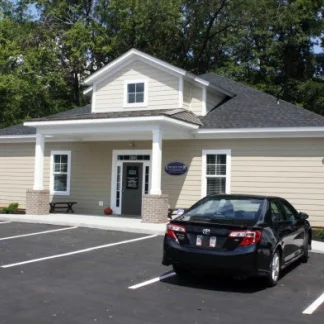Faith Home
Faith Home is a Christian nonprofit rehabilitation and recovery center, located ...
Cornerstone is located in Abbeville, South Carolina. Cornerstone prevention, intervention and treatment services for adolescents and adults who have been impacted by substance use disorders as well as problem gambling.
Contact us for more information: (864) 366-9661

Connect with Cornerstone by calling their admissions team directly.
(864) 366-9661 Website Get DirectionsThe Commission on Accreditation of Rehabilitation Facilities (CARF) is a non-profit organization that specifically accredits rehab organizations. Founded in 1966, CARF's, mission is to help service providers like rehab facilities maintain high standards of care.
CARF Accreditation: Yes
Whether a marriage or other committed relationship, an intimate partnership is one of the most important aspects of a person's life. Drug and alcohol addiction affects both members of a couple in deep and meaningful ways, as does rehab and recovery. Couples therapy and other couples-focused treatment programs are significant parts of exploring triggers of addiction, as well as learning how to build healthy patterns to support ongoing sobriety.
Research clearly demonstrates that recovery is far more successful and sustainable when loved ones like family members participate in rehab and substance abuse treatment. Genetic factors may be at play when it comes to drug and alcohol addiction, as well as mental health issues. Family dynamics often play a critical role in addiction triggers, and if properly educated, family members can be a strong source of support when it comes to rehabilitation.
Group therapy is any therapeutic work that happens in a group (not one-on-one). There are a number of different group therapy modalities, including support groups, experiential therapy, psycho-education, and more. Group therapy involves treatment as well as processing interaction between group members.
In individual therapy, a patient meets one-on-one with a trained psychologist or counselor. Therapy is a pivotal part of effective substance abuse treatment, as it often covers root causes of addiction, including challenges faced by the patient in their social, family, and work/school life.
The Life Skills Classes, is an evidence based program directed at middle or high school age students that helps teach them about making choices and healthy decisions in their lives. Some of the topics discusses are alcohol, tobacco, violence in the media, coping with anger and anxiety, communication skills, social skills and resolving conflicts.
Research clearly demonstrates that recovery is far more successful and sustainable when loved ones like family members participate in rehab and substance abuse treatment. Genetic factors may be at play when it comes to drug and alcohol addiction, as well as mental health issues. Family dynamics often play a critical role in addiction triggers, and if properly educated, family members can be a strong source of support when it comes to rehabilitation.
Group therapy is any therapeutic work that happens in a group (not one-on-one). There are a number of different group therapy modalities, including support groups, experiential therapy, psycho-education, and more. Group therapy involves treatment as well as processing interaction between group members.
In individual therapy, a patient meets one-on-one with a trained psychologist or counselor. Therapy is a pivotal part of effective substance abuse treatment, as it often covers root causes of addiction, including challenges faced by the patient in their social, family, and work/school life.
The Life Skills Classes, is an evidence based program directed at middle or high school age students that helps teach them about making choices and healthy decisions in their lives. Some of the topics discusses are alcohol, tobacco, violence in the media, coping with anger and anxiety, communication skills, social skills and resolving conflicts.
Group therapy is any therapeutic work that happens in a group (not one-on-one). There are a number of different group therapy modalities, including support groups, experiential therapy, psycho-education, and more. Group therapy involves treatment as well as processing interaction between group members.
In individual therapy, a patient meets one-on-one with a trained psychologist or counselor. Therapy is a pivotal part of effective substance abuse treatment, as it often covers root causes of addiction, including challenges faced by the patient in their social, family, and work/school life.
The Life Skills Classes, is an evidence based program directed at middle or high school age students that helps teach them about making choices and healthy decisions in their lives. Some of the topics discusses are alcohol, tobacco, violence in the media, coping with anger and anxiety, communication skills, social skills and resolving conflicts.
In individual therapy, a patient meets one-on-one with a trained psychologist or counselor. Therapy is a pivotal part of effective substance abuse treatment, as it often covers root causes of addiction, including challenges faced by the patient in their social, family, and work/school life.
The Life Skills Classes, is an evidence based program directed at middle or high school age students that helps teach them about making choices and healthy decisions in their lives. Some of the topics discusses are alcohol, tobacco, violence in the media, coping with anger and anxiety, communication skills, social skills and resolving conflicts.
The Life Skills Classes, is an evidence based program directed at middle or high school age students that helps teach them about making choices and healthy decisions in their lives. Some of the topics discusses are alcohol, tobacco, violence in the media, coping with anger and anxiety, communication skills, social skills and resolving conflicts.
Faith Home is a Christian nonprofit rehabilitation and recovery center, located ...